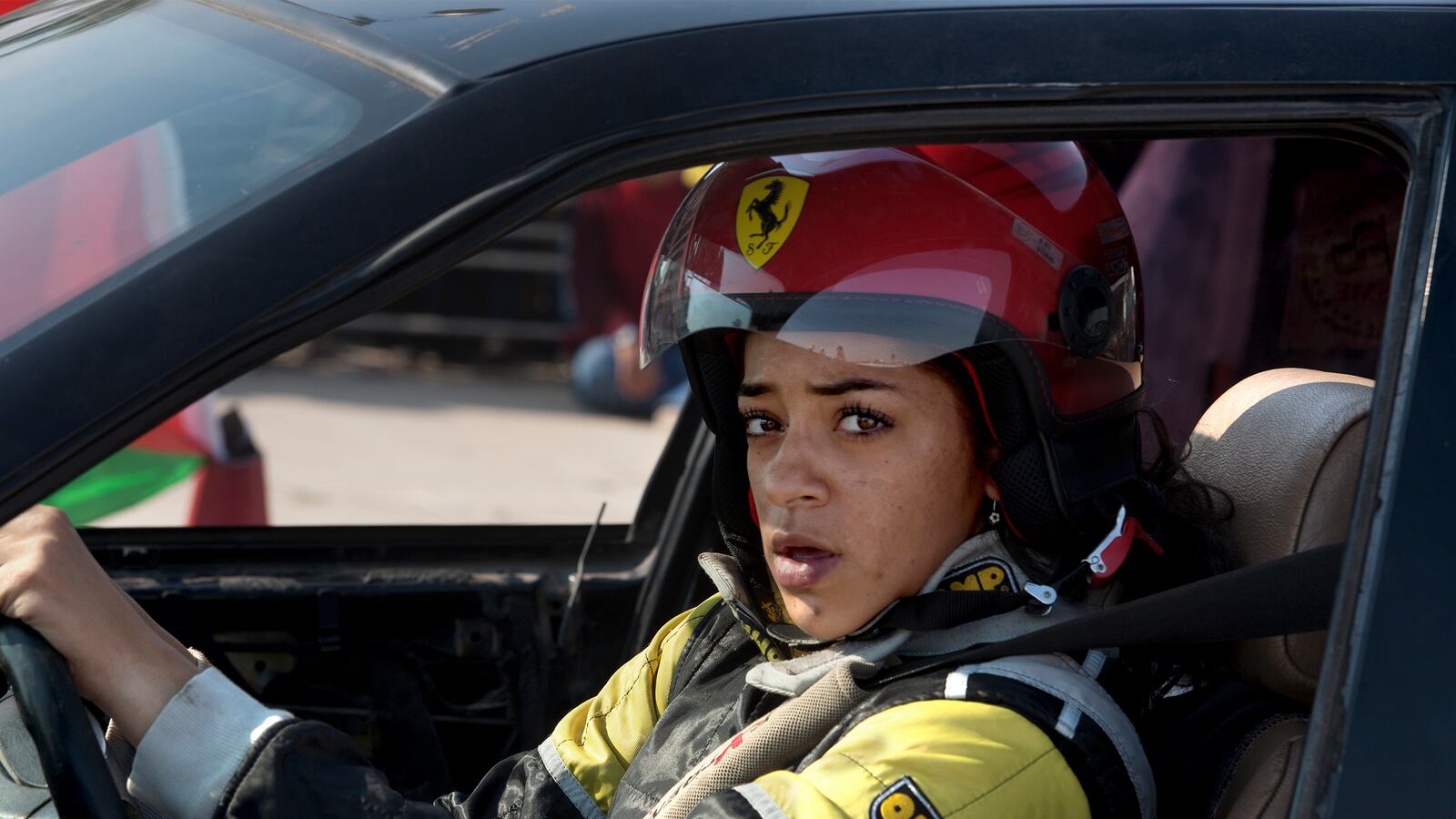The name of her car is Bonita, she said, a tricked out BMW E30. Like any pro racing vehicle, it’s plastered with logos of the corporate sponsors that provide the $20,000 to $30,000 a year that it costs to maintain, repair, and customize her ride, but Noor Daoud made sure that the name was prominently stenciled on the front windshield.
If you check out the 25-year old’s YouTube page, through the squeal of the tires and the roar of the engine, you’ll see clips of the world’s only female professional drift racer tearing up the track.
Daoud is one of the stars of the documentary feature, Speed Sisters, which made its New York premiere on Saturday at the DOC NYC Festival. The film follows Daoud and her teammates, Mona Quraan, Maysoon Jayyusi, Marah Zahalka, and Betty Saadeh as they navigate both economic hardships and Israeli checkpoints to compete in the high-speed, burgeoning, and yet largely male-dominated world of Palestinian motor sports.
On Saturday afternoon, Daoud and the film’s director, Amber Fares, sat down with the Daily Beast in a bustling Chelsea diner overloaded with afternoon brunch seekers. Between bites of steak and eggs, Fares explained that she got the idea for the film after being dragged by her producer to a race in Bethlehem. That such a thing could occur in and of itself was shocking.
“Given the restriction on movements and the limited amount of space available to Palestinians, I was like, ‘Where would they be racing?’” she said. “We went and there was a huge tarmac that was Arafat’s helicopter landing pad. There were a thousand people there, shouting, cheering and playing music, this huge, festive amazing scene, cars revving. And in the middle of it, there were these girls putting on their helmets, getting ready to ride.”
“I was like, what the hell!”

The bulk of the film takes places during the 2011 and 2012 seasons, with a focus on the competition between the relatively well-off, fashion-conscious Betty and Marah, whose father is putting in 16-20 hour days at work, and often not returning home for weeks at a time in order to fund his daughter’s career.
“In a sport where rounds are won by seconds, there's no attempt to hide the deeply competitive spirit that emerges,” the Daily Beast’s Nina Strochlic wrote. “Marah and Betty have a particularly intense rivalry, which lends a nice realism to a movie that doesn’t overdose on the feel-good love of sisterhood. ‘I hope she hits a cone,’ Marah mutters as Betty navigates the course in the film.”
Speed Sisters has been making the rounds of the festival circuit to both great critical and popular acclaim. At Hot Docs in Toronto, “they brought in 600 middle school kids that were lined up outside the door to take pictures afterwards,” Fares said. When the film was screened in Palestine, the theater was packed with an audiences that had the opportunity to “see themselves being portrayed on the screen in a way that they’ve never seen themselves before... There are now boys and girls starting out [in racing] that have these role models. It opens up doors in their own mind for what they're able to do.”
That in and of itself is a political act. As Daoud told Al Jazeera, “Everything you want to do involves politics here... Let’s just forget about that and play sports. But it’s not easy. Being a racer in Palestine is political. Being a woman... here, that is political as well.”
But after trying her hand at sports as varied as tennis, soccer, ice hockey, skiing, and snowboarding, once Daoud got behind the wheel, she knew she’d found her life’s work. “When I enter this beautiful, motorsports car—600 horsepower—I feel like the happiest girl in the world,” she says in the film.
Since the conclusion of principal photography, Daoud has decamped to the United Arab Emirates, leaving the Speed Sisters team and moving on to the faster, more perilous world of drift racing, while simultaneously earning a living as a skydiving instructor.
“It’s fun,” she said. “I was looking for a job in Dubai. For sure I’m not going to be a secretary or something sitting in an office all day. I can’t do that. I have so much energy. I have a problem with sitting in one place.”
Now, she competes all over the Middle East, Europe, and Asia, freed from the restrictions that are placed on an athlete in the occupied territories. Still, challenges remain, including the prohibitive costs for something as simple as working on her racing skills.
“I need to train a lot to become better and better,” she said. “I need sponsorships. Especially in Dubai, the tracks there are very expensive. So what we do is we bring a bunch of people and we share, but it’s still too much. For a few hours at Yas Marina, it’s 45,000 to 60,000 dirhams.” ($12,252.40 to $16,336.53 in U.S. Dollars.)
Still, she’s thriving, becoming the first Palestinian to not only enter, but also win a Formula 3 race in Israel.
“I’m doing great,” Daoud said. “And I have an event coming up. It’s the biggest event in the Middle East. It’s called the Red Bull Car Park Drift. It’s on the 20th and hopefully I’ll be competing.”
It’s this leap in confidence that marks the starkest difference from the then 21-year-old Daoud we see in the film, where she pings between moments of unfiltered, brash confidence and self-doubt.
When Saadeh is struck by a tear gas canister fired by an Israeli soldier after the team ventures too close to a checkpoint, as they rush to a hospital, Daoud doesn’t hold back, barking at her injured teammate, “You think because you’re blonde and pretty they’re not going to shoot you?”
For Fares, that moment is emblematic of the difficulty that’s faced not just by athletes, but also by all Palestinians.

“I think there’s the perception that they’re living under extreme violence at all times,” she said. “That’s not always the case, but sometimes, it’s worse than that, because you don’t know when the violence is going to pop up.”
“It’s not like there’s tear gas and guns going off 24 hours a day in all places, but it happens in a way that makes it very hard for you to determine your own life,” she added. “You never know what’s going to happen. ”
But Daoud also struggles to maintain the focus necessary to excel, waving off Marah’s help and struggling to memorize the route of an early race. It’s a pattern of behavior that’s reminiscent of her time spent training to be a professional tennis player at the prestigious IMG Academy in Florida.
“It was really hard,” Daoud said. “Every day, hours and hours, you know? I just wanted to get there. It’s always like, when I succeed, I go back. It’s like I’m afraid of success in a way. You know what I mean?”
If they ever decide to fictionalize the Speed Sisters story, Daoud knows who she’d cast in her role: Michelle Rodriguez. It’s not just that the two bear a stark physical resemblance, and Rodriguez (along with Vin Diesel) is Daoub’s favorite actor in the The Fast and the Furious franchise.
“Everybody thinks we’re very similar, like, the way she looks and the way she acts,” she said. “I feel like I’m connected also.”
As you might expect of a working professional, she considers the much-reviled third installment, The Fast and the Furious: Tokyo Drift to be, “the best in all the series. How they filmed it, it was you know like very accurate,” she said.
And Daoud has plans once her career on the tracks is over. She’s been working closely with a friend who specializes in modifying and repairing BMWs. “He’s teaching me a lot,” she said. “How to build engines, so I’m always sticking around his garage and checking out what he’s doing.”
Eventually she’d like to open her own garage.
“Why not? Bonita’s Garage. Modify men’s cars,” Daoud said with a wry grin. “Why not?”






